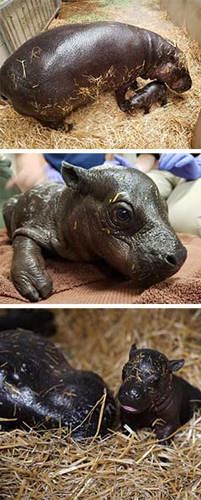It’s a boy! Pygmy hippo calf born at Franklin Park Zoo
Tuesday October 13, 2020
Late in the afternoon on Monday, October 5, Cleopatra, a pygmy hippopotamus, gave birth to a 13-pound male calf at Franklin Park Zoo.
The birth was a joyous moment marking the culmination of years of work, careful planning and dedication by the animal care and veterinary teams. The tiny male calf is the first pygmy hippo born at Zoo New England.
Because Cleopatra, affectionately known as Cleo, gave birth to stillborn calves in 2018 and 2019 due to prolonged labor, the decision was made early on in this pregnancy to induce her so that the veterinary team could assist if needed. On Saturday, October 3, Cleo received her first hormone injection to prepare her for labor, a second injection 24 hours later, and her care team monitored her and the baby around the clock through the weekend with ultrasounds every few hours. By late afternoon on Monday, October 5, she began showing signs of labor but no contractions. After oxytocin injections were not effective to induce contractions, the veterinary team manually delivered the calf.
 “The calf was immediately so bright, strong and aware, and was holding his head up right away. The calf was introduced to Cleo soon after birth and was nursing within a few hours,” said Dr. Eric Baitchman, Zoo New England Vice President of Animal Health and Conservation. “Each new birth contributes to the continued survival of this endangered species, and we are thrilled by this success. This is the result of years of teamwork and commitment, and I am incredibly proud of the Zoo team. We are also grateful to Dr. Carlos Gradil, a veterinary reproductive specialist in the Department of Veterinary and Animal Sciences at the University of Massachusetts Amherst who also holds an adjunct appointment at Cummings School of Veterinary Medicine at Tufts University, for his expert guidance and assistance throughout Cleo’s pregnancy and delivery.”
“The calf was immediately so bright, strong and aware, and was holding his head up right away. The calf was introduced to Cleo soon after birth and was nursing within a few hours,” said Dr. Eric Baitchman, Zoo New England Vice President of Animal Health and Conservation. “Each new birth contributes to the continued survival of this endangered species, and we are thrilled by this success. This is the result of years of teamwork and commitment, and I am incredibly proud of the Zoo team. We are also grateful to Dr. Carlos Gradil, a veterinary reproductive specialist in the Department of Veterinary and Animal Sciences at the University of Massachusetts Amherst who also holds an adjunct appointment at Cummings School of Veterinary Medicine at Tufts University, for his expert guidance and assistance throughout Cleo’s pregnancy and delivery.”
The pregnancy was detected via ultrasound on March 2, 2020, and ultrasounds were conducted continually throughout Cleo’s pregnancy to monitor the baby’s development. The gestation for pygmy hippos is six to seven months. Due to the wonderful training program between Cleo and her care team, the staff at Zoo New England were the first to be able to monitor a pygmy hippo pregnancy via ultrasound from early gestation, at only four weeks.
Zoo New England participates in the Pygmy Hippo Species Survival Plan (SSP), which is a cooperative, inter-zoo program coordinated nationally through the Association of Zoos and Aquariums (AZA). SSPs help to ensure the survival of selected species in zoos and aquariums, most of which are threatened or endangered, and enhance conservation of these species in the wild. Cleo’s pregnancy is a result of an SSP breeding recommendation with her mate Inocencio. The population managed by the Pygmy Hippo SSP is small and skewed toward females, which makes this birth even more significant.
In a cooperative international effort, Inocencio arrived at Franklin Park Zoo in December 2013 from the Parque Zoologico Buin Zoo in Chile where he was born. At the time of his arrival, he was too young to breed with Cleo. As pygmy hippos are solitary animals, the eventual introduction between Cleo and Inocencio was carefully coordinated.
While the birth of the male calf is the result of natural breeding, prior to this Dr. Baitchman led an effort at Zoo New England to develop artificial insemination techniques for this species. In 2016, after years of preparation, and again with the assistance of Dr. Gradil, Zoo New England accomplished something never before achieved anywhere in the world: we successfully thawed viable samples of pygmy hippo semen which we had collected from Inocencio and frozen in liquid nitrogen. The milestone marked a major step forward in securing a better future for these endangered animals.
Prior to the introduction to Inocencio in 2017, staff did attempt to artificially inseminate Cleo, though it did not prove successful. Despite this, Zoo New England’s staff gained a lot of knowledge and experience that can be shared with colleagues as we work collaboratively to better understand the reproductive physiology and behaviors of these endangered animals – all of which may help to bolster the numbers of this species in the future.
Pygmy hippos are native to West African rainforests in the countries of Sierra Leone, Guinea, the Ivory Coast and Liberia. This endangered species faces increasing threats including shrinking natural habitat as the result of logging, farming, mining and human settlement.
Because of their reclusive nature, they are difficult to count in the wild. According to the International Union for Conservation of Nature (IUCN), it is estimated that there are less than 2,500 individuals left in their native habitat in West Africa.

